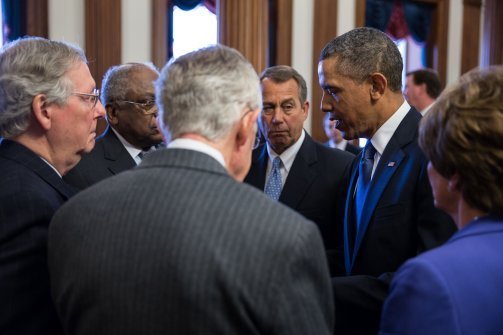It’s really extraordinarily pleasing to watch a terribly misinformed view of presidential power finally get its comeuppance. Various political scientists—Brendan Nyhan, Jon Bernstein, Andy R., me, and others—have been pushing back at this view for years. And now, as Andy pointed out, beware the pundit who ventures forth with calls for the president to exert “leadership,” to “rise above circumstance,” to be “hopeful” and “show he still enjoys his job,” to “throw his back into it,” and so on. (And note those are links not just to the usual punching bags—Dowd, Fournier—but to people who seem to understand that presidential power is limited but just can’t help themselves.) These pundits get hit, and quickly, with realtalk from the likes of Jamelle Bouie, Jonathan Chait, Elizabeth Drew, Ezra Klein, and Greg Sargent.
But what’s increasingly striking about the residual Green Lanternism is not that it’s wrong in some academic sense, but that it completely misunderstands what Obama is actually doing right now. Obama—who was once mystifyingly naive about how much presidents can change the political process—now gets it. Hence his comment about “the literature on presidential overreach in second terms.” Hence his comment about the “Jedi mind-meld.” Hence his comment about the “Aaron Sorkin liberal fantasy.” Hence his comment about “permission structure.”

Now Brian Beutler actually does, you know, some reporting and tells us what “permission structure” means:
In this instance, the “permission structure” refers to Obama’s efforts to convene a bipartisan group of senators who can reach a budget deal without his direct imprimatur, according to both White House and Senate aides. His recent dinners with members of both parties were designed to ferret out the Republican and Democratic senators who are likeliest to agree to a mix of higher taxes and lower spending, much like the defunct gang of six did in 2011.“Obama’s trying to see if he can’t get some of those rational actors from the dinners — or at least the people who came across as being earnest and willing — to tackle the grand bargain talks again,” said a Senate Democratic leadership aide. “The White House trying to set up a process where rank and file Republicans are working with rank and file Democrats and once that’s done, step back [and] create the space for those discussions to take place among rank and file lawmakers outside the context of another Obama-Boehner style negotiation.”
Obama’s putative absence is key to creating the political space Senate Republicans need to negotiate in good faith.
Obama’s “putative absence” is exactly what drives Green Lanternists like Dowd up the wall, but it’s entirely in line with the political science, notably Frances Lee’s finding that the very act of a president taking a position on an issue can polarize members of Congress even further. So will it work? Maybe, maybe not. But it’s a much better strategy than the beautiful words and body language that too many pundits still seem to want.
- Bulenox: Get 45% to 91% OFF ... Use Discount Code: UNO
- Risk Our Money Not Yours | Get 50% to 90% OFF ... Use Discount Code: MMBVBKSM
Disclaimer: This page contains affiliate links. If you choose to make a purchase after clicking a link, we may receive a commission at no additional cost to you. Thank you for your support!



Leave a Reply